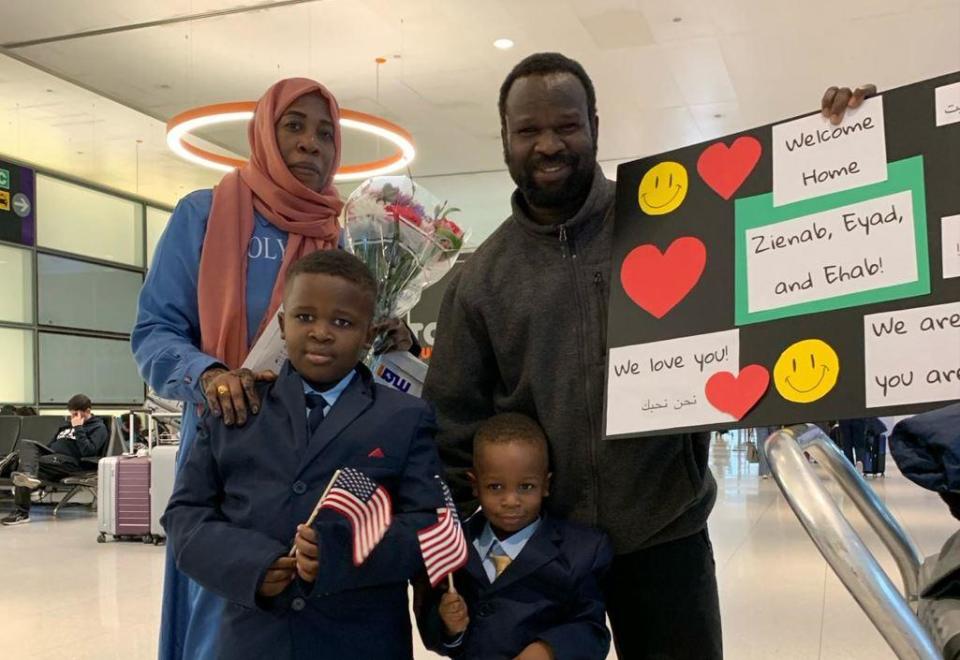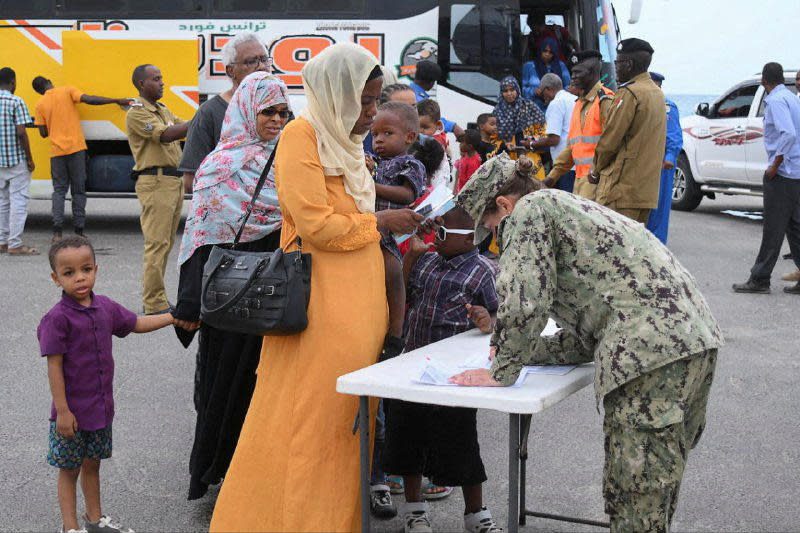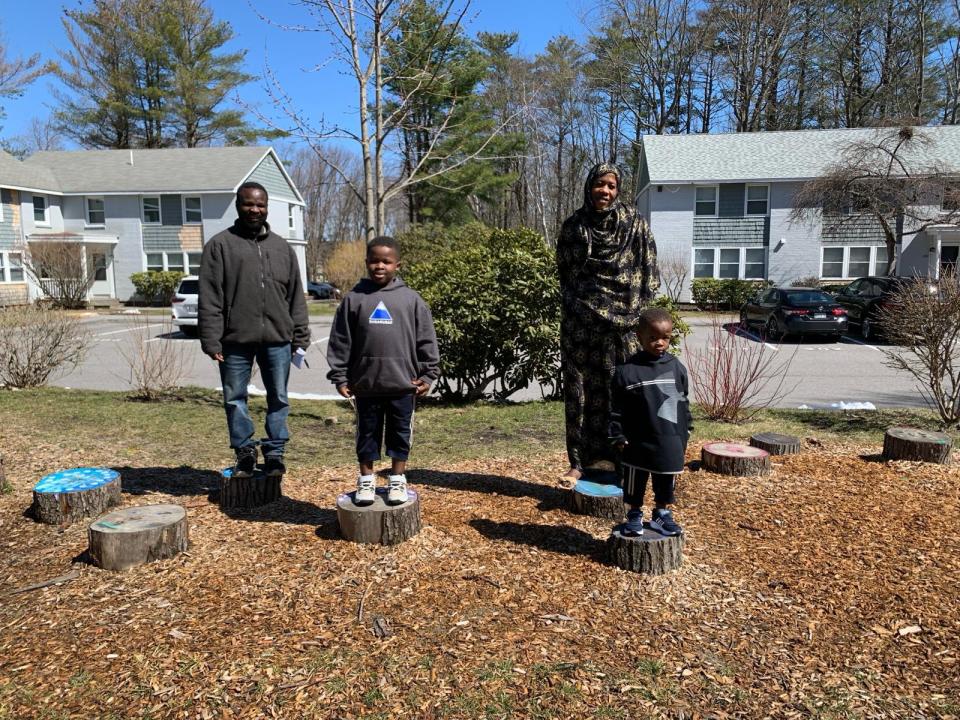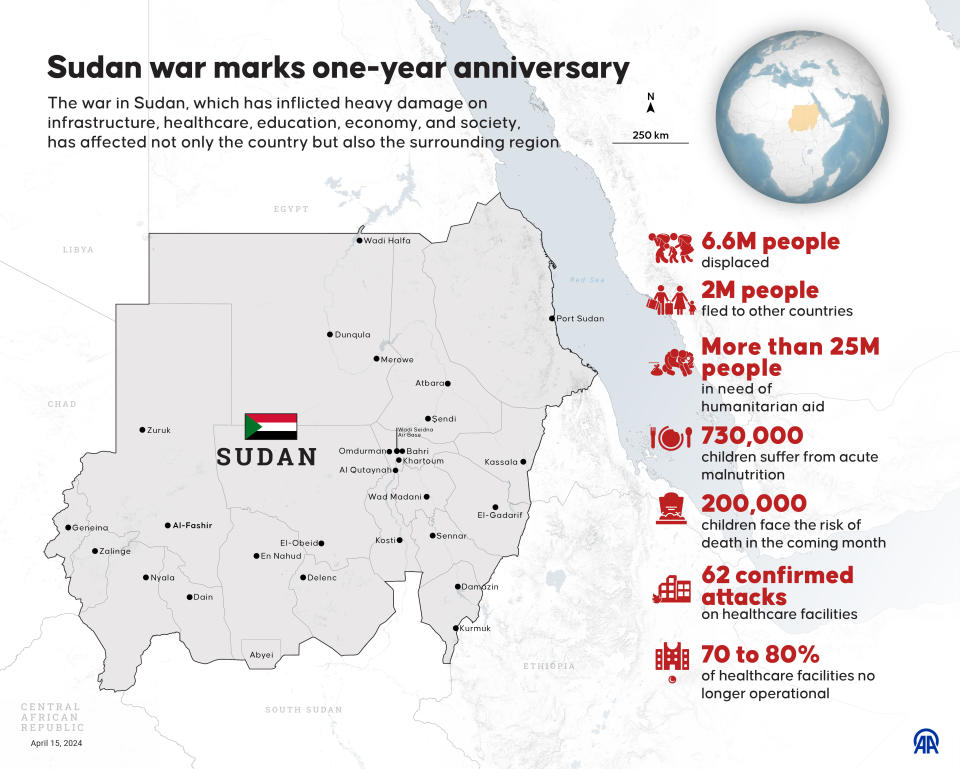U.S. family finally reunited after escaping Sudan's yearlong civil war
"Tears were running down my face," El-Fadel Arbab told CBS News of his joyous reunion with his wife and two young sons. "I just wanted to cry from all the happiness."
After 332 anxious days brought on by the war that has now raged in Sudan for a year, the Sudanese-American's worry, work, and wait to reunite with his family finally came to an end.
One day in late March, Arbab waited in the arrivals hall at Boston's Logan International Airport, holding a poster decorated with red hearts and yellow smiley faces he'd cut out himself. In English and Arabic were the phrases: "We love you!" and "We are happy you are here!"
The security doors opened, and 3-year-old Ehab and 7-year-old Eyad, both sporting blue suits and ties, entered the United States for the first time. Zienab Abaker, in a peach-colored head covering, smiled and hugged her husband.

A nightmare, followed by "a dream come true"
Arbab's family fled Sudan's embattled capital city of Khartoum with a United Nations convoy just two weeks after war broke out. They made it to the Port of Sudan, on the country's east coast, joining millions of others trying to escape the bloodshed as rival military and paramilitary commanders battled for power over the country.
A U.S. Navy ship ferried Abaker and her boys, along with 300 other refugees, east across the Red Sea to the Port of Jeddah, in Saudi Arabia. But by then, her husband Arbab, working in Portland, Maine, had lost contact with his family.
"No WiFi. No phone. We were researching if any news or anything," he said.
Then, last spring, he saw a photograph of his wife and boys featured in an article on CBSNews.com, part of a series of reports as our team sailed from Jeddah to Port Sudan and then back again on a Saudi naval ship ferrying refugees. The image, taken by a Reuters photographer, showed Abaker and the boys undergoing screening by a U.S. soldier at Port Sudan. It was proof they had safely made it to the coast, at least.
"I was just in tears," he said. "It was like a dream come true."

He expected his wife and sons to arrive within weeks, so he quickly rented a two-bedroom apartment and furnished it with donations from the community where he's lived for the past two decades.
But his family's journey had just begun. They made it to Saudi Arabia, but that's where they got stuck.
While Arbab's sons are U.S. citizens by birth, his wife is not. The family had submitted all the necessary paperwork for her to get a visa to enter the U.S. before the war broke out, but it had not yet been issued.
Arbab jumped through U.S. immigration hurdle after hurdle, brandishing the photograph of his family at Port Sudan to officials at the State Department in the U.S. and embassy officials in Saudi Arabia, while also working three jobs to support his family 6,000 miles away and to pay for the new apartment in Maine.
Meanwhile, Abaker was stuck living in a hotel, taking care of her sons alone, not permitted to leave, and in constant fear of being arrested and deported back to Sudan. The younger boy, traumatized by the conflict he'd escaped, stayed up at night and slept during the day.
"She is strong and patient," said Arbab, "but had no room for happiness."
Finally, there was reason to smile.
"The only happiness was when she received her passport. They say you get the visa and you're going to the United States and your husband. Then she felt like she could be happy," he recalled.

Arbab said his family were the first Sudanese nationals to make it out of their limbo in Saudi Arabia and reach the U.S., for which he's extremely grateful. But he added that "dozens and dozens" of people remain stuck in similar circumstances.
War traps millions in an "apocalyptic catastrophe"
There has been no sign of the vicious conflict between the Sudanese Armed Forces and the rival Rapid Support Forces paramilitary group easing since it erupted on April 15, 2023. Before turning against each other, the rival generals who led those well-armed groups staged a coup together against a fragile transitional government that had been trying to steer Sudan toward democracy.
Since they fell out, their war has killed 14,000 men, women and children, according to the United Nations. More than 8.2 million people have been displaced from their homes, with those who've been able fleeing abroad, and countless others seeking any respite they can find in a country with little access to food, running water or health care.
"Khartoum has collapsed into a warzone for the past year and millions of Sudanese remain trapped there, essentially blockaded," Alan Boswell, Horn of Africa project director at the International Crisis Group think tank told CBS News.
"Millions of Sudanese are barreling into famine and could starve to death this year," he said, calling it "the sort of apocalyptic catastrophe that seems something only for the history books."
On Monday, the grim one-year anniversary of Sudan's war, France hosted an international conference to raise money for the war-torn country from Western and Gulf nations.
Aid shortfall as the world focuses "on the new thing"
Boswell, speaking to CBS News from the sidelines of the conference, said the humanitarian mission was about ensuring both funding and security for Sudan — both of which he stressed were severely lacking. While the U.N. estimates that $2.7 billion is required urgently to assist the people of Sudan, only $166 million has been received so far — a mere 6% of the total.
"Ideally, there would be an announcement of hundreds of millions of dollars more that have been committed for humanitarian relief in Sudan. But a big part of the problem has been the Sudanese army side of the war essentially blocking food relief into areas they don't control, which is much of the country."

Late Monday, French President Emmanuel Macron announced the conference had seen an additional $2.1 billion of assistance pledged to Sudan, but he gave no breakdown of who the donors were, or any timeline on when the money might actually start to help on the ground.
Arbab told CBS News from his home in Portland that, from what he could tell, "as long as there are more wars starting somewhere," powerful Western governments will simply continue to "focus on the new thing and forget about the old one."
"It did not go unnoticed that the only time the world really focused on the Sudan war was in getting its own citizens evacuated," agreed Boswell. "Then interest in the Sudan war rapidly dissipated."
But he warned that "the conflict might not stay inside Sudan," noting that the African nation is surrounded by other fragile states, many of them also gripped by conflict, "and there's quite a large risk of the instability spreading."
Escaped circus elephant, Viola, stops traffic in Montana city
Paris Olympics flame lit as athletes prepare for Summer Games
Biden hits campaign trail as Trump's New York trial enters 2nd day

